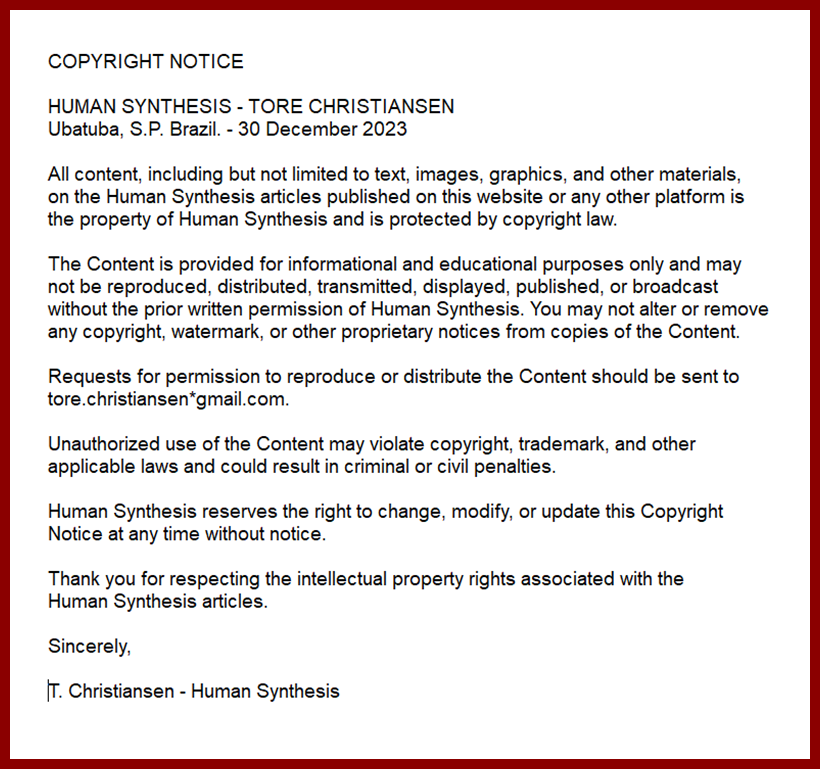‘We are stepping up,’ UK defence secretary tells ‘coalition of the willing’ for Ukraine – Europe live
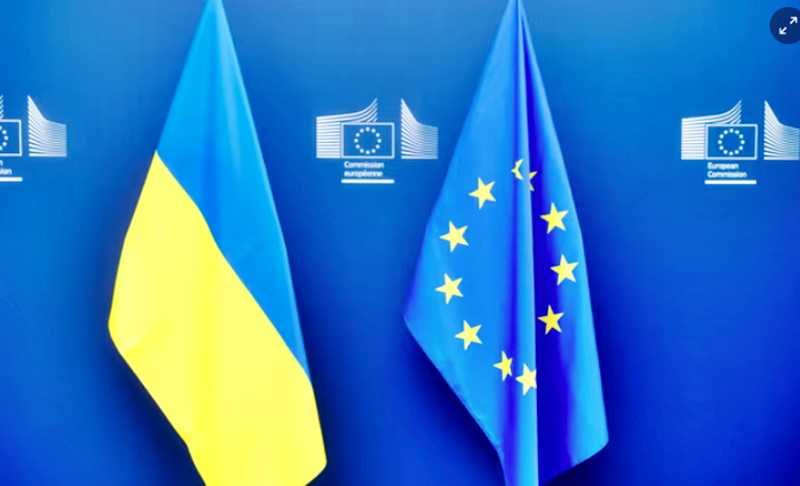
By Guardian-Jakub Krupa-Thu 10 Apr 2025 14.18 BST
John Healey tells meeting of more than 30 countries that coalition is working on ‘putting Ukraine in the strongest possible position’. 'We are stepping up,' UK's Healey says as he talks of 'well developed' plans to support Ukraine.
We are now moving inside the room, where the UK defence secretary John Healey opens today’s meeting.
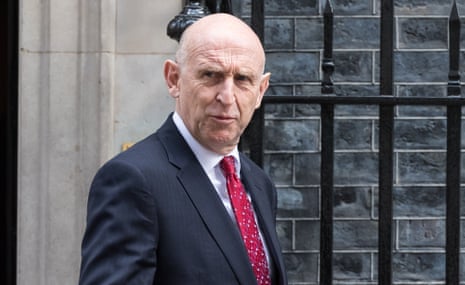
He starts by thanking over 200 military planners from 30 countries working on what the coalition could do to “put Ukraine in the strongest possible position to protect its sovereignty and to deter any further Russian aggression.”
He says the plans are “well developed” with “clear objectives” of securing safe skies, safe seas, a peace on the land, and supporting the Ukrainian armed forces “to become their own strongest possible deterrent”
“Our reassurance force for Ukraine would be a committed and credible security arrangement to ensure that any negotiated peace does bring what president Trump has pledged, a lasting peace for Ukraine,” he says.
Ministers will hear a presentation from UK and French chiefs of defence, Adm Tony Radakin and Gen Thierry Burkhard on the preparatory work so far.
He says the coalition also “cannot jeopardise the peace by forgetting about the war,” with more support needed for Ukraine.
“We’re stepping up. We’re serious. We’re sending a signal to president Putin and to [Ukraine’s defence] minister Umarov and the Ukrainian people. We stand with you in the fight, and we will stand with you in the peace,” he says.
And that’s concludes the open part of the meeting as their talks will continue behind the closed doors.
'Important to have the US on board,' Dutch minister says, as he hopes for clarity on coalition's plans
Dutch defence minister Ruben Brekelmans says today’s meeting is more “political” about various scenarios for Ukraine.
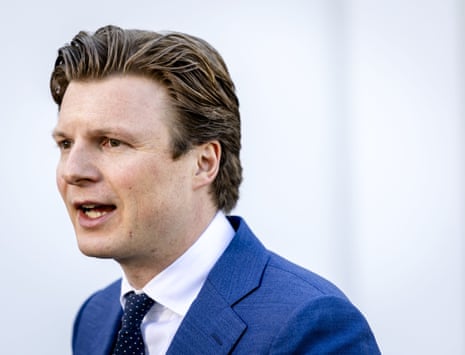
He says that many countries, including the Netherlands, need to go through domestic approval procedures for any deployment, so “it is important that there is a clear picture on what such a mission would entail.”
He explicitly says it would be important to have the US’s backing, but says the exact role needed would depend on the format of the mission.
“So you use the word peacekeeping mission, it’s a very different definition than a assurance mission. So it really depends on the goal of the mission,” he says.
“I think it’s very important to have the United States on board. But then it also needs to be clear what type of mission and what we ask from the United States. And that’s what we will discuss also today,” he says.
'It's clear Ukraine wants peace, but Russia, so far, doesn't,' EU's Kallas says
Back in Brussels, EU foreign policy chief Kaja Kallas notes in her comments that it has been over four weeks since Ukraine agreed to an unconditional ceasefire, but Russia is yet to make an equivalent commitment.
“It’s clear that Ukraine wants peace, but Russia, so far, does not,” she says.
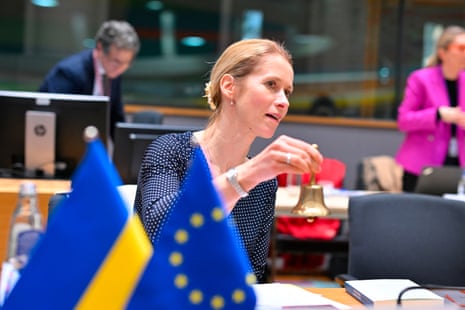
On reassurance force, she says there needs to be more clarity if its role is to deter, to monitor, or to keep peace on the ground.
“And that is very much related to whether we have peace or not. So far we don’t have peace,” she says.
She is asked about the fact the US defence secretary is not involved in talks today and tomorrow, but sidesteps that and merely says that “it is also in the interest of the US that there is stability and peace in Europe.”
“We have to map what we all can do so this is the position where we are and … trying to also keep the United States on board,” she says.
Meanwhile, Polish prime minister Donald Tusk spoke on the phone with European Commission president Ursula von der Leyen in the aftermath of the EU’s decision to suspend its retaliatory tariffs on the US.
In a social media update he said:
Defending our interests in a tough and decisive way and at the same time protecting our transatlantic alliance against all odds is our common goal. This was the conclusion of my today’s talk with @vonderleyen.
'Several things' need clarifying before decision is made on reassurance forces, Swedish minister says
Swedish defence minister Pål Jonson also said that there were “a number of questions that we need to get clarified” to progress talks on the deterrence force in Ukraine.
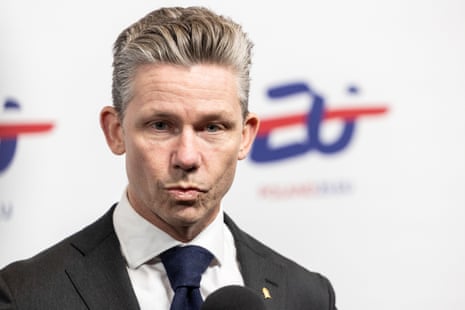
“I think there [are] several things that have to sorted out before we can make any kind of commitment,” he says, but does not rule out Sweden engagement.
“There is strength in numbers,” he says.
Russia has 'no desire for peace', Finnish minister says
Finnish defence minister Antti Häkkänen says that allied countries see “that Russia does not have enough desire for peace,” which makes it more important to look at strengthening Ukraine’s position in talks.
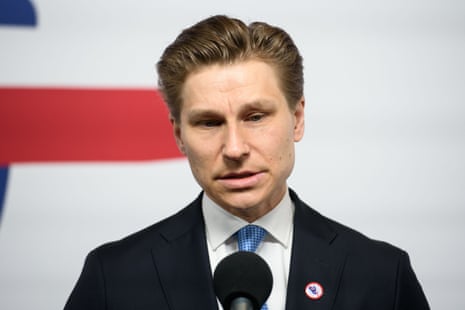
He says the ministers will also get military briefings on the current situation on the frontline, and have a discussion on what sorts of forces and capabilities would be most helpful as the reassurance forces.
Häkkänen says that it remains important to have the US involved in guaranteeing Ukraine’s security, but does not go into details.
We need to 'support Ukraine through strength,' Latvian minister says
Arriving at the meeting in Brussels, Latvian defence minister Andris Sprūds said the group has a clear goal to “support Ukraine through strength” to push for a “sustainable” peace.
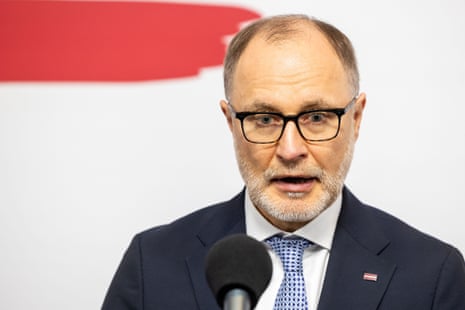
He says the so-called “reassurance force” – a form of deployment of allied troops to Ukraine to safeguard peace in case of a peace deal – will be discussed, but added that “there are several dimensions to it,” and he “would not go … public before we make some decisions.”
He said some countries had “discussions … nationally … what they can contribute.”
He confirms Latvia “considers potentially contributing,” but says eastern countries need to also maintain strong forces to protect themselves from a potential Russian aggression.
'Coalition of the Willing' meets in Brussels to talk about Ukraine
Ministers from more than 30 countries in the so-called “Coalition of the Willing” are now arriving for their meeting in Brussels.
The summit, hosted by UK defence secretary John Healey and French defence minister Sébastien Lecornu, will look at advancing their plans in support of Ukraine.
I will bring you all the key lines from their meeting here.
You can watch arrivals with me below, and the talks start at the top of the hour.
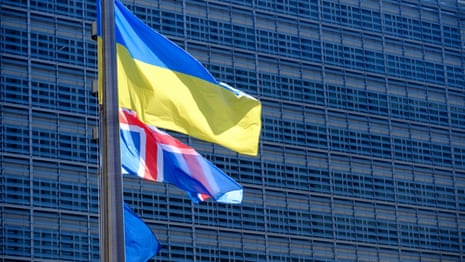
France to tighten mobile phone ban in middle schools
Meanwhile, France is to tighten its ban on the use of mobile phones in middle schools, making pupils at the ages of 11 to 15 shut away their devices in a locker or pouch at the start of the day and access them again only as they are leaving.
EU had no advance notice of US tariff pause, spokesperson suggests
EU spokesperson Gill gets asked to offer more detail on EU trade commissioner Šefčovič’s call with US commerce secretary Lutnick and if the EU had any advance warning of the planned US tariff pause.
He says the pair spoke “two nights ago,” and it was “a kind of, a touching base call, just for both sides to provide a state of play.”
He then says there was no advance warning and appears to question if even Lutnick knew it was coming:
“I don’t believe that any mention of the American pause was coming in that call, but then I doubt that the interlocutor was aware that it was coming. I could be wrong about that, but that just my own reflection.”
But the commission spokesperson Gill is having a slightly trickier time explaining why the EU has paused its countermeasures, even though they were imposed in response to the first round of US tariffs on steel and aluminium, which actually remain in place, and not the ‘reciprocal’ tariffs that were paused by Trump last night.
He says:
The answer is quite clear.
We’ve pressed the pause button to allow space for negotiations.
So yes, the US, steel and aluminium tariffs are now in place, not just against us, but against the entire world. And yes, the car tariffs are in place.
But we are not going to take any further steps right now, because we want to leave space for negotiation. We want to talk to our American counterparts.
He also confirms that EU trade commissioner Šefčovič spoke with US commerce secretary Lutnick “a couple of nights ago, where they just kind of took stock of where things stood,” but adds “that was before the [pause] announcement by president Trump.”
Gill also gets asked about the technical process.
He says:
We have postponed what we had planned for next week.
What happened yesterday was that member states gave us a mandate to go forward with it. That’s not, that doesn’t mean it has automatically happened. They’ve simply given us a mandate to do it.
So our intention was to publish the legal act that would allow the tariffs to click in next week and we have now paused that.
© 2025 Guardian News & Media Limited or its affiliated companies. All rights reserved. (dcr)
The Guardian’s expert news coverage is funded by people like you, not a billionaire owner. Readers who choose an All-access digital subscription make the most impact and enjoy great benefits in return. Will you join them today?
We know, we know, we know …
Seeing these messages is annoying. We know that. (Imagine what it’s like writing them … )
But it’s also extremely important. One of the Guardian’s greatest assets is its reader-funded model.
• Reader funding means we can cover what we like. We’re not beholden to the political whims of a billionaire owner. No-one can tell us what not to say or what not to report.
• Reader funding means we don’t have to chase clicks and traffic. We’re not desperately seeking your attention for its own sake: we pursue the stories that our editorial team deems important, and believe are worthy of your time.
• Reader funding means we can keep our website open, allowing as many people as possible to read quality journalism from around the world – especially people who live in places where the free press is in peril.
At the moment, the Guardian’s work is funded by just 2.4% of our regular readers. If you’re in the other 97.6%, appreciate our work and believe that good journalism is important to protecting democracy in an age of misinformation, please consider joining the readers in Brazil supporting the Guardian today. It only takes a minute and you can cancel at any time. Thank you.
Support $3/monthRecommendedSupport $15/monthUnlock All-access digital benefits:
- Unlimited access to the Guardian app
- Unlimited access to our new Feast App
- Ad-free reading on all your devices
- Exclusive newsletter for supporters, sent every week from the Guardian newsroom
- Far fewer asks for support
Support with another amountContinueRemind me in May
